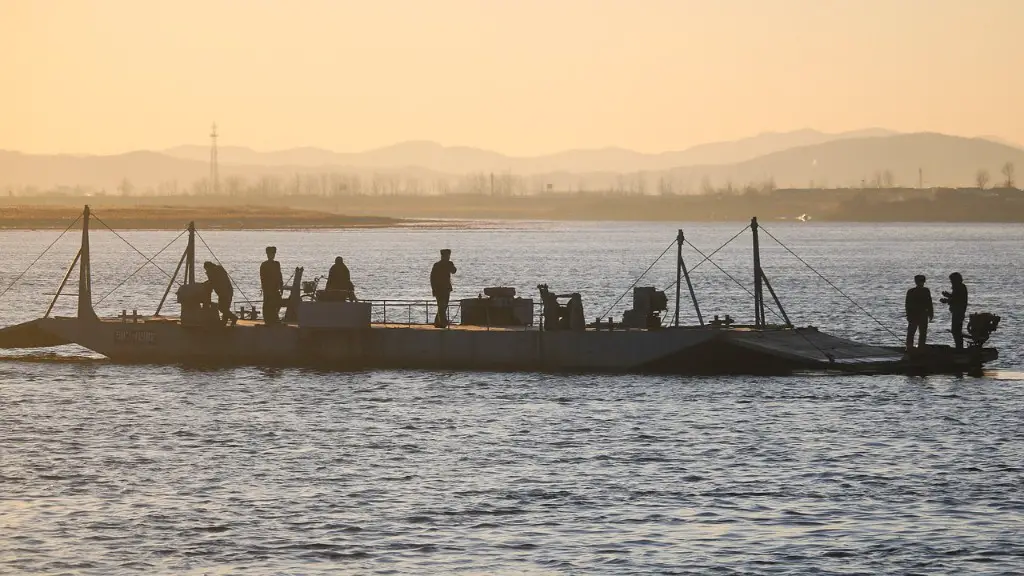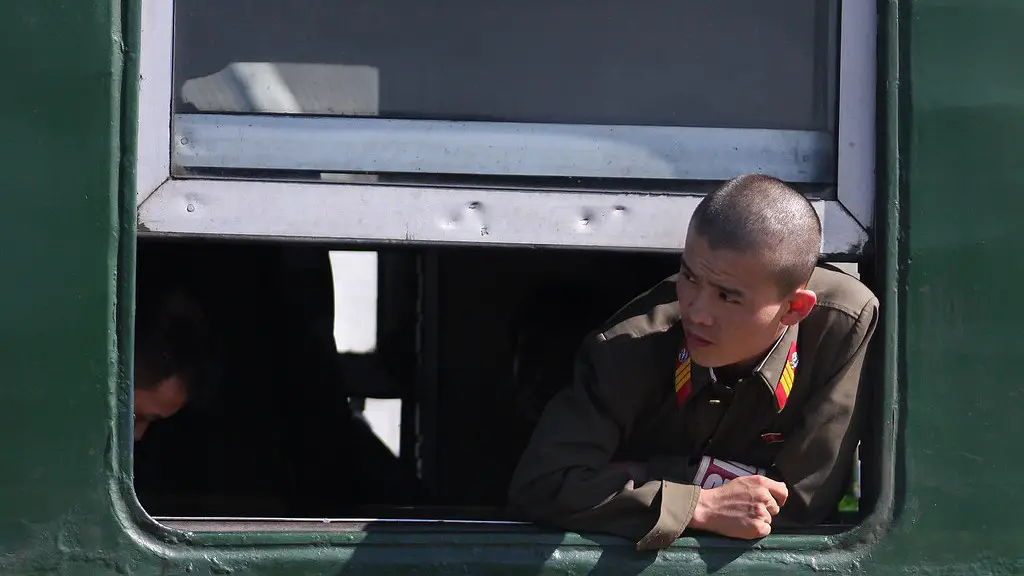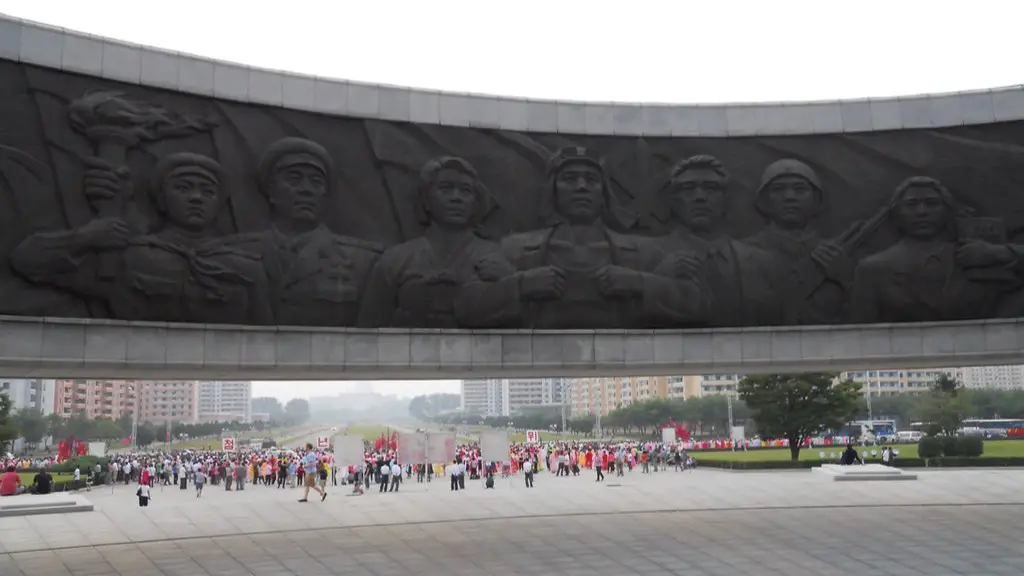What Next For North Korea
Speculation regarding the future of North Korea has been growing over the past several years. From the economic and political turmoil in the country, to its nuclear weapons testing and ballistic missile launches, to the unpredictability of its leaders, the future of North Korea is uncertain. To understand the path that North Korea may take in the future, one must consider the internal and external forces at play.
Internally, North Korea stands at a crucial point in its history. After decades of autocratic rule, some suggest that the North Korean people are feeling a growing desire for change. This can be seen in the increasingly rapid growth of market exchanges in North Korea, in which individuals are increasingly engaging in independent economic activities. Observers also point to the fact that North Korea’s younger generation of leaders has pursued an unusually open attitude in some areas.
At the same time, North Korea’s leaders have remained committed to their strong nuclear weapons program and have refused to participate in any international arms treaties. This has led to intense criticism from the international community, and it has put North Korea in a difficult diplomatic position. Although it is difficult to assess what the internal motivations of the North Korean leadership are, it is clear that the current foreign policy stance of North Korea is unlikely to change in the foreseeable future.
Externally, the situation in North Korea is complicated by the presence of both China and the United States in the region. China is North Korea’s closest ally, providing it with much-needed aid and political support. At the same time, the United States has increased its presence in the region in recent years, leading to heightened tensions between the two world powers. Meanwhile, the regional powers of South Korea, Japan and Russia have struggled to develop a unified policy towards North Korea, complicating the situation even further.
Experts agree that the situation in North Korea is highly complex and that the future of the country remains uncertain. Some suggest that the best solution for North Korea is for the regime to pursue a more open approach to the international community and to engage in talks with the other regional powers. Others argue that the only realistic option for resolving the situation is to impose economic sanctions or other punitive measures on North Korea. Yet whatever the solution may be, it is clear that it will require a delicate balance between the different forces at play in the region.
Regional Relations
Moreover, in endeavoring to ascertain what may be ahead for North Korea, it is important to consider the country’s relations with its fellow regional states. As mentioned previously, China is North Korea’s closest ally and it is thought to be the only country able to influence North Korea in any significant way. As such, the economic, political, and security trends that emerge in China are likely to have a dramatic effect on North Korea’s future.
In addition, North Korea’s relations with the United States, South Korea, Japan and Russia are playing an increasingly important role in shaping the situation in the region. All of these countries have different interests in the region and different approaches to dealing with North Korea, meaning that there is likely to be some tension and mistrust in the region for the foreseeable future. Yet despite this, all of these countries are continuing to pursue dialogue and diplomatic initiatives in order to ensure peace and stability in the region.
Finally, it is worth noting that North Korea’s behavior towards other countries in the region has a significant impact on the future of the country. North Korea has been accused of carrying out a number of provocations and aggressive actions in recent years, and these have only further strained relations between the North and the other states in the region. Therefore, it is likely that North Korea will need to modify its behavior in order to restore some level of stability and normalcy in the region.
International Relations
Much like their regional counterparts, the international community is playing an increasingly important role in shaping the future of North Korea. Despite the fact that the United Nations and many Western countries have imposed economic sanctions on North Korea, the country has still found a way to pursue foreign economic and political relationships with countries around the world. In particular, North Korea has fostered close ties with China, Iran, and Russia, among others.
In addition, many in the international community have grown concerned about North Korea’s nuclear weapons program, particularly given its refusal to engage in talks with the other regional powers. As such, the future of the country is likely to be shaped by the reaction of the international community to North Korea’s actions. If North Korea were to abandon its nuclear weapons program and participate in talks with the other regional powers, it could potentially open the door to a new era of international engagement and cooperation.
On the other hand, if North Korea continues to insist on maintaining its nuclear weapons program, then it is unlikely that the international community will be willing to engage with the North in any meaningful way. In this scenario, it is likely that further economic sanctions or other punitive measures will be imposed, further isolating North Korea from the international community.
Economic Perspective
Finally, it is important to consider the economic perspective of the situation in North Korea. While it is true that the country is facing significant economic hardship due to international sanctions, domestic policies and regional instability, there is also an increasingly vibrant private sector emerging in the country. This sector is supported by internal reforms aimed at liberalizing the economy and encouraging private enterprise, as well as by foreign countries, most notably South Korea, that have provided economic aid and support to the country in recent years.
It is also worth noting that the economic situation in North Korea is largely dependent on the geopolitical situation in the region. Therefore, if North Korea were to engage in talks with the other regional powers, or if international sanctions were to be lifted, then the North Korean economy could potentially benefit from increased investment from the international community. On the other hand, if the international community continues to insist on a hard-line stance towards North Korea, then the pent-up economic potential of the country is likely to remain unrealized.
In conclusion, the future of North Korea remains uncertain. Internal and external forces both play a role in shaping the situation in the region, and it is clear that the North Korean leadership must take into account the concerns and interests of both the regional and international communities in order to ensure peace and stability in the region.
International Community Response
As the international community has begun to witness the potential level of instability that North Korea’s actions can generate, it has been forced to respond accordingly. The United Nations, along with many Western nations, have responded with programmes of economic sanctions, in attempts to hinder the development of North Korea’s nuclear weapons capability.
Despite this, North Korea’s leadership remain uninterested in ceding to the demands of the international community and appears determined to complete the completion of its nuclear weapons capability. This has led some experts to suggest more extreme measures of economic sanctions and the potential for military intervention. Nevertheless, the United Nations and the majority of international powers have remained reluctant to pursue such aggressive tactics towards the much smaller nation.
As the situation has developed, many powers have begun advocating for a more moderate approach, encouraging negotiations and dialogue with North Korea as a way of reaching some sort of agreement. In spite of this, North Korea remains reluctant to enter into any meaningful or honest negotiations with the international community, choosing instead to vociferously reject heated demands and instead calling for ‘absolute sincerity’ in any dialogue.
Given North Korea’s reluctance to agree to negotiations and their refusal to even consider abandoning their nuclear weapons programme, it has become increasingly clear that the international community may need to accept an unwelcome truth. As the situation develops, the potential of achieving a peaceful resolution to the issue has become increasingly unlikely.
Power Balance
In attempting to forecast what may eventually become of North Korea, it is important to consider the balance of power between the international community and North Korea. This balance has been heavily influenced by the involvement of several powerful countries in the region, most notably the United States and China.
The United States, as one of the largest military powers in the world, is often seen as representing the interests of the international community and is frequently the leader of efforts to reach a diplomatic resolution. In addition to this, the United States and some of its allies are often at the forefront of imposing economic sanctions on North Korea, something which has proven to be effective in the past.
At the same time, China remains North Korea’s closest and most influential ally, with significant economic and political ties to the North Korean state. Chinese Premier Xi Jinping has proven himself to be a powerful advocate for North Korean interests and he is often seen as the key mediator between North Korea and the international community.
Given this power balance, it is clear that whichever country, or group of countries, is able to sway North Korea’s leadership in a particular direction will likely be the ones who will ultimately decide the future of the nation. As such, it appears that the balance of power between China, the United States, and the international community will have a significant impact on the future of North Korea.
Conflict Resolution
In terms of resolving the ongoing conflict in the region without resorting to extreme measures, there is much discussion about the potential for talks between the North Korean leadership and the international community. However, it remains to be seen if North Korean leadership will be willing to participate in a meaningful dialogue in the near future.
At the same time, many of North Korea’s regional neighbours are attempting to come to terms with the potential implications of North Korea’s actions. South Korea, Japan, and Russia have all looked to the international community to seek a peaceful resolution, while at the same time attempting to limit the potential damage of North Korea’s actions.
Finally, many believe that North Korea’s internal situation must be considered if any meaningful resolution is to be achieved. As such, the efforts of NGOs, activist groups, and private citizens have become increasingly important in working towards a more stable and prosperous future for North Korea.
Regardless of the final outcome, it is clear that the future of North Korea will not be determined overnight. In addition to continuing diplomatic efforts, the internal and external forces at play in the region must be carefully balanced in order to ensure a stable and secure future for North Korea and the world as a whole.





